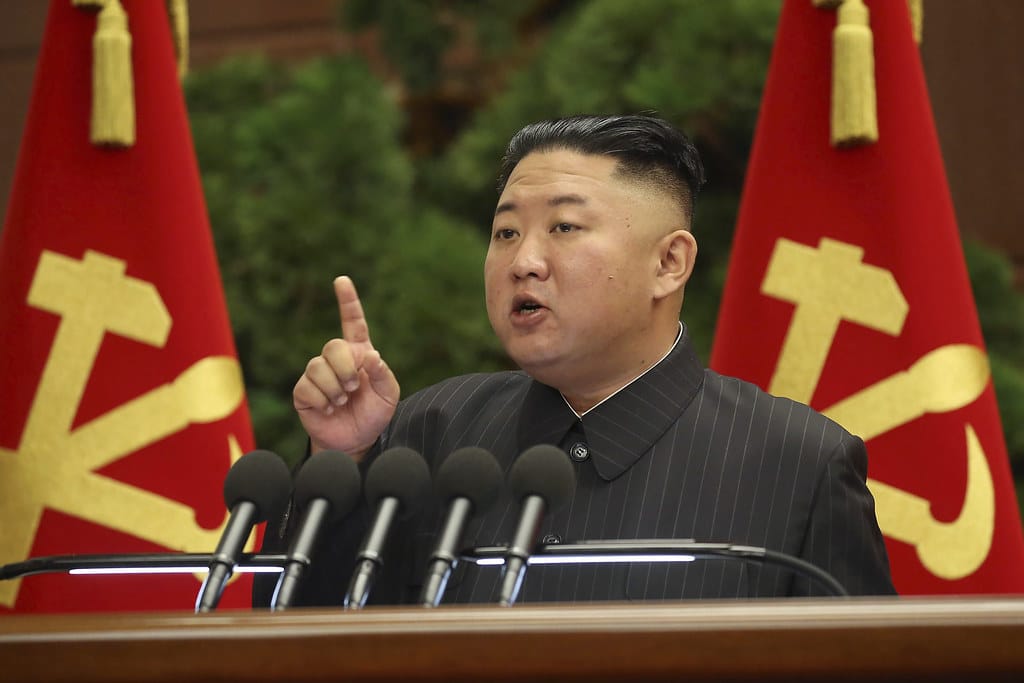Joe Biden has managed to embrace nearly all of the worst, most dangerous options with respect to U.S. policy on the Korean Peninsula. Washington’s policy toward North Korea is utterly sterile and ineffective. The glimpses of hope during Donald Trump’s administration that the United States might adopt a fresh approach instead of clinging to its longstanding, unattainable demand that North Korea abandon its nuclear weapons program have vanished. Biden abandoned even Trump’s modest policy deviations. Instead, his administration has resumed the insistence on Pyongyang’s complete denuclearization, along with placing strict limits on the country’s ballistic missile capabilities. North Korea continues to test missiles with ever longer ranges as U.S. leaders fume impotently.
At the same time, the Biden administration shows no inclination to re-examine the risk-reward calculation with respect to Washington’s alliance with South Korea, even as Pyongyang is now acquiring the capability to strike the American homeland. Indeed, administration officials are moving in the opposite direction, emphasizing the U.S. defense commitment to its longstanding dependent and discouraging any hints that Seoul may wish to take greater responsibility for its own defense—especially if such an initiative includes the acquisition of an independent nuclear deterrent. Instead, U.S. leaders are working to enlist South Korea as a pawn in a geostrategic chess match directed against China in exchange for a more robust U.S. commitment to defend Seoul against its North Korean adversary.
The continuing, if not intensifying, patron-client relationship between the United States and South Korea was underscored in the joint declaration that Biden and South Korean President Yoon Suk-yeol issued following their April 26, 2023, summit meeting; “The ROK has full confidence in U.S. extended deterrence commitments and recognizes the importance, necessity, and benefit of its enduring reliance on the U.S. nuclear deterrent.” If that wasn’t enough to emphasize South Korea’s continuing security dependence on the United States, the declaration added, “President Yoon reaffirmed the ROK’s longstanding commitment to its obligations under the Nuclear Nonproliferation Treaty as the cornerstone of the global nonproliferation regime.”
Perpetuating America’s risk exposure in that fashion was bad enough, but Biden went out of his way to rattle sabers at North Korea:
“President Biden reaffirmed that the United States’ commitment to the ROK and the Korean people is enduring and ironclad, and that any nuclear attack by the DPRK against the ROK will be met with a swift, overwhelming and decisive response. President Biden highlighted the U.S. commitment to extend deterrence to the ROK is backed by the full range of U.S. capabilities, including nuclear.”
Such statements were decidedly unhelpful, given the already tense environment on the Korean Peninsula. But Biden managed to inflame the situation further. “Going forward, the United States will further enhance the regular visibility of strategic assets to the Korean Peninsula, as evidenced by the upcoming visit of a U.S. nuclear ballistic missile submarine to the ROK.” North Korea’s regime is notoriously prickly and prone to engage in saber rattling of its own. However, even a more sedate government likely would feel threatened by such a provocative U.S. deployment in its immediate neighborhood.
Washington needs to adopt the opposite course to the one it is pursuing toward both North and South Korea. The Biden administration’s ossified policy toward Pyongyang is especially frustrating and dangerous. The president’s commitment to the futile zombie policy of trying to isolate North Korea was confirmed when Washington imposed new sanctions following a new round of tests in January 2022. If the administration does not change course, it is likely just a matter of time until Pyongyang resumes testing not only ICBMs, but nuclear weapons. In early February 2022, China’s ambassador to the United Nations correctly emphasized that the United States needs to come up with “more attractive and more practical” policies and actions to reduce tensions with North Korea and avoid a return to a “vicious circle” of confrontation, condemnation and sanctions over its nuclear and ballistic missile program.
U.S. leaders should seek ways to establish a normal bilateral relationship with North Korea. That means easing and eventually eliminating the vast array of economic sanctions that have been imposed over the decades. It also means negotiating a treaty formally ending the Korean War and establishing full diplomatic relations between the two countries. If such actions are not taken, the United States faces the imminent prospect of having no meaningful relations with a country that has an expanding nuclear arsenal combined with delivery systems capable of striking the American homeland. One would be hard pressed to identify a more dangerous situation.
The drastically changed nuclear weapons environment also underscores why the United States needs to remove itself from the front lines of the tense situation between North and South Korea. U.S. leaders should encourage South Korea’s greater strategic autonomy, not try to stifle independent initiatives. Even the decision about acquiring nuclear weapons should be made in Seoul, not Washington. There is no question that South Korea can provide for its own defense. It has an economy 40 to 50 times greater than North Korea’s, and it is a technological juggernaut. Keeping a weak, vulnerable Seoul as a U.S. strategic dependent was a highly questionable policy even during the early decades of the Cold War. Keeping a strong, fully capable South Korea as such a dependent, despite rapidly escalating risks to the United States, is monumentally foolish.
President Biden’s Korea policy risks the worst possible scenario. Continuing to treat North Korea as a pariah increases the likelihood of rash, desperate behavior on Pyongyang’s part, which could rekindle the dormant Korean War. Continuing to treat Seoul as a U.S. protectorate makes it certain that if an armed conflict between the two Koreas does break out, the United States would be hopelessly entangled. It would be a challenge to identify a more dangerous, bankrupt policy than the one the Biden administration is pursuing.

































